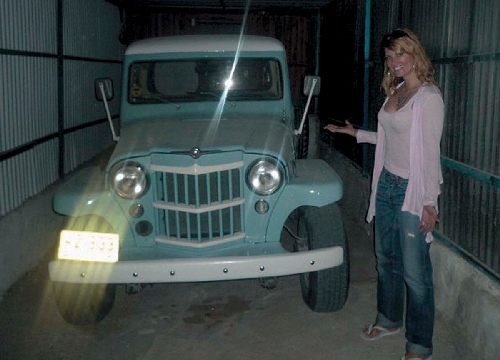Modest cars rule in Israel
Lately, travels have taken me to the four corners of the world and not always for business.
My fiancé's sister's wedding took place in Israel, a tiny Middle East country located on the right-hand coast of the Mediterranean Sea, sandwiched between Egypt, Jordan, Lebanon and Syria.
We stayed in the bustling beach city of Tel Aviv -- population, about 390,000 -- and then took educational and entertaining day trips to Jerusalem and Masada where we received a first-hand taste of world history.
However, as an automotive enthusiast, I naturally observe car cultures wherever I go. It's different everywhere, but what I noticed during our time in Israel is that there really isn't a car culture at all.
The tour guides said that Israel is not a cash-strapped nation by any means, but it's not a wealthy one either. People who are well off generally don't wave around money like some do in North America.
The people work hard and live modestly. While people in the United States who enjoy affluent lifestyles might own several expensive vehicles and get a thrill out of showing off the latest Lamborghini, this lifestyle is unheard of in Israel.
I'm told that people who earn a good living would be embarrassed to display that type of wealth to their countrymen. They place more importance on saving for the future and their children's educations. The most extravagant car I saw during my 10 days in Tel Aviv was an Audi A6, considered a higher-end vehicle here, but my no means extravagant.
Perhaps there are few hardcore automotive enthusiasts who stash their V-8-powered Cadillac CTS or an Aston Martin V-8 Vantage, or perhaps Israelis just never grew up with kind of attachment to the automobile that North Americans have.
On our first excursion out of Tel Aviv on a four-hour bus trip to the holy land of Masada for an overnight hike and a history lesson, I paid particular attention to the traffic. Maybe I should say lack of traffic, because there was never a time during the combined eight-hour journey that we found ourselves surrounded by more than a couple of vehicles let alone stuck in gridlock.
The desert roads had few cars and that had me wondering what the land might have been like a couple of thousand years ago. On the highway stretches I certainly didn't see any fancy rides, just modest and very-well-worn small cars. In place of Ferraris and Aston Martins, I saw camels transporting men and goods. It was almost surreal and, dare I say, somewhat refreshing in a basic sort of way.
When we arrived at our next destination, Jerusalem, I was surprised by how crowded and active it was. You feel both a bustling vibe and an intense spiritual energy. The architecture is exactly how you probably picture it and only one style exists with concrete as the basic color.
The diversity of people was incredible. There were young students wearing trendy clothes, working men wearing suits and then an abundance of people dressed to honor their respective religions. But the car scene, once again, was nonexistent.
People in Jerusalem choose to be mostly on foot and care more about protecting their holy land and preserving its meaning and religious tradition than driving in a sparkling, expensive ride that stands out like an attention-seeking sore thumb. In Jerusalem the modest cars and subtle sounds they make blend in with the equally modest, historic architecture.
It's fascinating that lifestyles and cultures are so very different as you make your way around the world. If I had grown up in Israel, I probably would not care about the cars I drive. But, those in Israel might not understand, or even be conscious of what it's like to grow up in a family that has learned to really appreciate the power, sound and aesthetic of a great automobile. That's part of our heritage and not theirs.
My life has always been connected with cool cars, but it's important that regardless of where we come from, we have a positive attitude about who we are and that we honor all people, regardless of how they travel and what they perceive as being important.
Among her numerous accomplishments, Courtney Hansen is the author of the "Garage Girl's Guide" the host of Spike TV's "PowerBlock," the former host of TLC's "Overhaulin'" and a writer with Wheelbase Communications. You can e-mail her by logging on to www.wheelbase.ws/mailbag.html.














